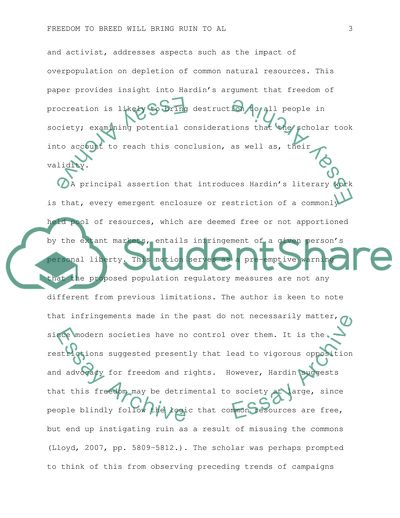Cite this document
(Freedom to Breed Will Bring Ruin to All Report Example | Topics and Well Written Essays - 3000 words, n.d.)
Freedom to Breed Will Bring Ruin to All Report Example | Topics and Well Written Essays - 3000 words. https://studentshare.org/social-science/1824156-freedom-to-breed-will-bring-ruin-to-all-what-considerations-drive-garrett-hardin-to-this-conclusion-and-are-they-defensible
Freedom to Breed Will Bring Ruin to All Report Example | Topics and Well Written Essays - 3000 words. https://studentshare.org/social-science/1824156-freedom-to-breed-will-bring-ruin-to-all-what-considerations-drive-garrett-hardin-to-this-conclusion-and-are-they-defensible
(Freedom to Breed Will Bring Ruin to All Report Example | Topics and Well Written Essays - 3000 Words)
Freedom to Breed Will Bring Ruin to All Report Example | Topics and Well Written Essays - 3000 Words. https://studentshare.org/social-science/1824156-freedom-to-breed-will-bring-ruin-to-all-what-considerations-drive-garrett-hardin-to-this-conclusion-and-are-they-defensible.
Freedom to Breed Will Bring Ruin to All Report Example | Topics and Well Written Essays - 3000 Words. https://studentshare.org/social-science/1824156-freedom-to-breed-will-bring-ruin-to-all-what-considerations-drive-garrett-hardin-to-this-conclusion-and-are-they-defensible.
“Freedom to Breed Will Bring Ruin to All Report Example | Topics and Well Written Essays - 3000 Words”. https://studentshare.org/social-science/1824156-freedom-to-breed-will-bring-ruin-to-all-what-considerations-drive-garrett-hardin-to-this-conclusion-and-are-they-defensible.


